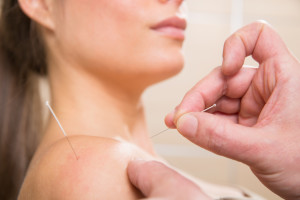
IVF pregnancy rates have been improving over the years. This is because of the use of better stimulation protocols, improvement in embryology techniques, ICSI, assisted zona hatching, better embryo selection, use of ultrasound guidance for embryo transfer etc. Despite these improvements, the overall pregnancy rate for IVF is around 30%. Alternative and complementary medical therapies are also being investigated as adjuvants to further improve outcomes. Of these, acupuncture is the most commonly used among couples seeking fertility care in the US. Acupuncture involves the insertion of special needles into the skin along so-called meridians (energy channels). It is truly a science and is used in China for providing anesthesia for major surgeries. The question is “Does acupuncture improve IVF clinical pregnancy rates?”
This very issue was addressed by a group of investigators from several countries (US, UK, China, The Netherlands) in a recent meta-analysis published in the journal Human Reproduction Update. (Manheimer et al., published June 27, 2013).
They analyzed the literature on acupuncture and IVF and only included trials in which acupuncture involved the insertion of needles into traditional meridian points. The needles could be inserted into tender points in addition to the traditional meridian points, and also the needles could also be electrically stimulated. When acupuncture is used to assist conception, the points are selected to improve blood flow to the uterus to make it more receptive to the embryo. They included randomized controlled trials that compared needle acupuncture administered within 1 day of embryo transfer, versus sham acupuncture or no adjuvant treatment. The primary outcome was clinical pregnancy rates.
They included sixteen trials (4021 patients) in the meta-analyses. There were several differences in the methodologies used in these studies. The timing of the acupuncture relative to the embryo transfer, the number of acupuncture treatments (1 – 3), location (usually at the IVF clinic) were variables that were taken into consideration. Twelve trials reported that the ‘de qi’ needling sensation (i.e. pain, achiness, stinging or dullness at the needle insertion site, which is an indication that the acupuncture needle has been correctly placed) was sought. Others did not report on de qi. No trial used electroacupuncture. For all trials, the mean numbers of embryos transferred was similar between the randomized groups.
The results are interesting. There was no statistically significant difference between acupuncture and controls when combining all trials [risk ratio (RR) 1.12, 95% confidence interval (CI), 0.96–1.31; 16 trials; 4021 patients], or when restricting to sham-controlled (RR1.02, 0.83–1.26; 7 trials; 2044 patients) or no adjuvant treatment-controlled trials (RR1.22, 0.97–1.52; 9 trials; 1977 patients). They did sophisticated statistical analyses to correct for the variables mentioned above. The smaller trials did seem to show a larger effect of acupuncture. However, when the data are pooled, and a large number of patients are included, these differences disappeared. The authors conclude that there was no benefit of adjuvant acupuncture for IVF.
At InVia Fertility Specialists a small but significant percentage of patients are using adjunctive acupuncture for IVF. The feedback I get from these patients is overwhelmingly positive. A very commonly reported benefit of acupuncture seems to be stress relief. Also, those following a Chinese diet (gluten free, dairy free, alcohol free, with rice being allowed) have lost weight and have reported an increased feeling of well-being. These are the reasons why continuing acupuncture seems reasonable. However, Manheimer et al.’s paper seems to suggest that the benefit does not extend to improving pregnancy rates.

Dr. Karande is Board Certified in the specialty of Obstetrics and Gynecology as well as the subspecialty of Reproductive Endocrinology and Infertility. He is a Fellow of the American College of Obstetricians and Gynecologists and Member of the American Society for Reproductive Medicine.
Subscribe to our weekly blog digest

Entire Website © 2003 - 2020
Karande and Associates d/b/a InVia
Fertility Specialists

Comments